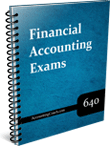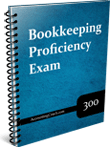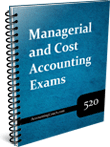
Welcome to issue 3 of The Student Accountant, the official E-newsletter of
Accounting-Basics-For-Students.com!
In this issue:1. Six Reasons to Get Inspired About Accounting!2. Questions from Student Accountants 3. A Simple Dictionary of Accounting Terms 4. Competitions Extended!

1. Six Reasons to Get Inspired About Accounting!This article is for accounting students, not for managers, who also should know accounting and be inspired about studying the subject, but for very different reasons. In upcoming editions of The Student Accountant I’ll go over reasons managers and businessmen should know accounting.For now, here are six reasons in case you’re in need of some inspiration to continue and progress in your studies:
So… Keep at your studies, soon you’ll have all the rewards listed above! You. Can. Do. It. 2. Questions from Student AccountantsIn each issue of The Student Accountant newsletter, we’re going to list some of the latest questions from accounting students that have been posted on the Accounting-Basics-For-Students.com website regarding any accounting lessons and topics. Some of these questions may not be of interest at all… If so, no worries, you’re not expected to read each one. Just browse through the list below and click on any questions that interest you to see the full article, and just skip the rest... Also, feel free to submit comments on any of the questions/articles themselves. Here are the latest and greatest accounting questions that have been submitted and answered: 
3. A Simple Dictionary of Accounting TermsThere is an accounting dictionary. It’s simple and easy to use and defines hundreds of terms you will encounter in your studies.
And it’s available here on Accounting Basics for Students.
Well, over the course of my tutoring, lecturing and writing course materials for hundreds and hundreds of hours, I found that most students did not really understand even the simple terms like debit and credit, gross and net, capital and reserves, let alone more complicated terms like working capital and provisions. What do you think happens when you don’t really understand a term like any of the ones mentioned above? What happens is that you have difficulty understanding the concept being discussed (or just never fully get it at all), and at the end of the day you usually have to either resort to parrot learning or you have to reread something a number of times (like banging your head into a wall) or you flunk that section of your accounting studies. Oh man, what a pain in the you-know-what! That’s why I created the dictionary – so accounting makes a lot more sense and is a lot easier. Fewer headaches. With an accounting dictionary, you just look up the strange accounting words you read – and, because I explain them simply – you get it. No banging your head against a wall or tearing your hair out to try and get what the textbook says. You just understand it. Plain and simple. You use it as a handy guide that you can refer to whenever you come across an accounting term you don’t feel you are totally certain about in your studies (there are hundreds of these terms if you really think about it). 
4. Competitions Extended!As mentioned in the last issue, we created a whole section on the site just to hear what you have to say – called Your Voice. In this section you can create your own Personal Web Page, post funny, crazy or horrifying Accounting or Student Stories and find or submit details of Accounting Tutors. And there are multiple competitions happening right now for these pages! Submit a qualifying entry to any of the three pages above and you stand a chance of winning a copy of the official Accounting Basics for Students E-book, valued at $25! In future we’re gonna add more prizes to this section, but for now, the accounting book ain’t too shabby on its own. And now, the competitions have been extended indefinitely! ~ The Editor New! CommentsHave your say about what you just read! Leave me a comment in the box below. |
Search this site:
All the lessons on this site, plus much, much more...
The official Accounting Basics for Students e-book
Subscribe to
The Student Accountant newsletter




